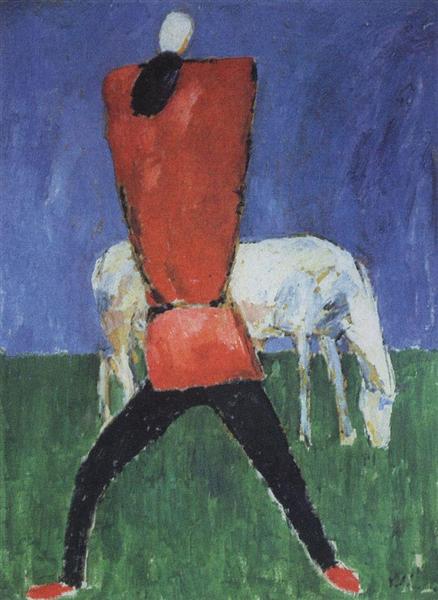Description
Kazimir Malevich, a visionary of the abstract art of the twentieth century, is mainly known for its fundamental role in the development of suprematism. However, the work "Man with horse" of 1932 reveals a different facet, less purely abstract but equally powerful in its simplicity and symbolism. This painting marks a significant moment in his career, when his work began to move away from the strict use of suprematist geometric language and reincorporate figurative elements, all in the complex context of the Soviet Russia.
When observing "man with horse", the first thing that captures attention is austerity and chromatic containment. Malevich uses a reduced palette, dominated by turned off and earthly tones that seem to reflect the simplicity and dignity of rural life. The man and the horse, the undisputed protagonists of the painting, They are delineated with geometric shapes and soft curves that, although simplified, retain surprising strength and presence. The man, with an inexpressive and geometric face, holds the horse not so much with his hands as with his mere existence shared in the fabric, suggesting a tacit symbiosis between them.
The composition of the work is as intriguing as its individual elements. The man seems placed in a static, almost meditative posture, in which his union with the horse creates a silent narrative but loaded with meaning. The lines that make up their bodies are clear, almost severe, but do not feel rigid. The smooth and clean contours establish a quiet tension; They evoke the paradox of robust serenity that can be found in peasant life, something that Malevich should have observed with a critical eye.
Malevich's reinterpretation of the human figure in this work, although less abstract than its previous supreme pieces, does not neglect the search for the essence. Man is not represented with individualism or detail, but as an archetype, a symbol of the common human being and his daily struggle. Similarly, the horse can be seen not only as an animal, but also as a symbol of work, strength and inseparable company of the rural man.
It should be noted that at the beginning of the 1930s, Malevich began to reinstate figurative images in his work, possibly as an answer to the external pressures of the Soviet regime that demanded more accessible and understandable art for the people. This return to figuration was never a mere regression, but an evolution that maintained its philosophical and intact aesthetic essence. "Man with horse" is a clear testimony of this delicate balance that Malevich handled with such ingenuity: the union between formal simplicity and symbolic depth.
In summary, "Man with horse" is a work that, in its apparent simplicity, encapsulates the artistic vision of Kazimir Malevich in a moment of transition. It is a tribute to rural life, a work full of symbolism, and proof that the force of painting resides both in what it shows and in what it suggests. In this seemingly simple but deeply rich work, Malevich manages to communicate the universality of human experience with clarity and depth that only one master of his caliber he could achieve.
KUADROS ©, a famous paint on your wall.
Hand-made oil painting reproductions, with the quality of professional artists and the distinctive seal of KUADROS ©.
Art reproduction service with satisfaction guarantee. If you are not completely satisfied with the replica of your painting, we refund your money 100%.

